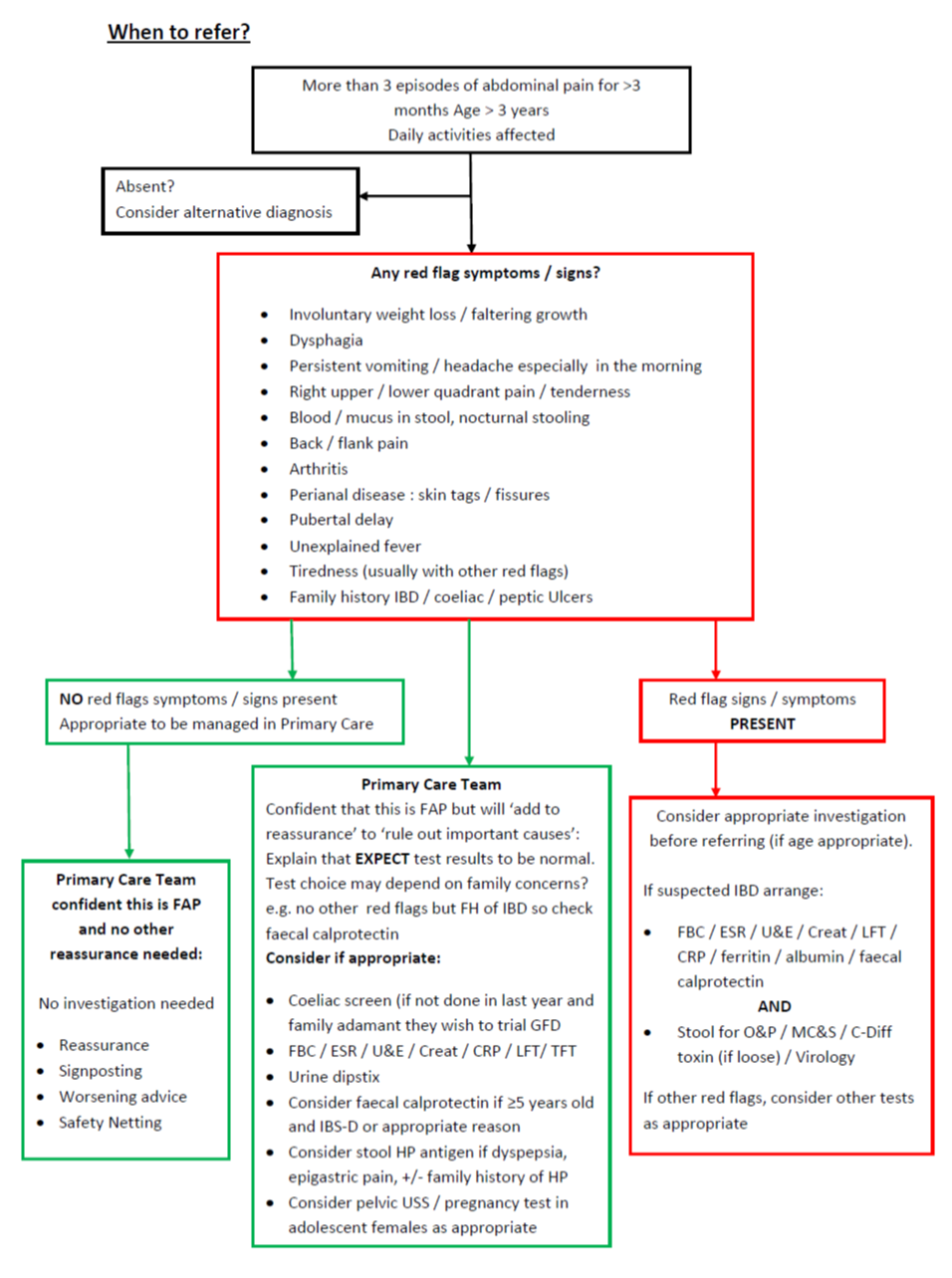Information
IBS/FAP is common. 10-15% of school aged children will experience abdominal pain but 90% of these children will have no organic pathology identified. FAP is usually multifactorial; anxiety and parental attention to symptoms usually make things worse whereas acceptance and support usually promote improvement. The teams at SJH & RHSC/RHCYP have come together to create this helpful guide to be used by anyone supporting families with possible FAP – including health visitors, school nurses, primary care teams (nursing and medical) as well as other people engaged in the care of younger people, more detailed information can be found here: Paediatric IBS and Abdominal Pain
Typically, children and young people with functional bowel conditions will show many of the features:
- >3 episodes per month for at least 2m
- in IBS, pain is often related to opening bowels and also often a change is bowel habit
- >3 yr old
- daily activities are affected
- usually primary care tests are all negative
- may be associated with other symptoms – headache, sleep disturbance
Assessment:
- ask about location of pain, bowel habit, exacerbating and relieving factors and check if the child is well between episodes
- dietary triggers: irregular eating patterns, overeating, diets high in fat, sugar, caffeine, carbonated drinks
- physical triggers: recent viral illness, food intolerances, chronic illness, low activity levels
- psychosocial triggers: problems at school, problems at home, significant life events, use of social media, school avoidance
- FHx triggers: parents/carers or siblings with IBS, GORD, constipation, mental health problems
- remember to unlock parental ICE: ideas, concerns and expectations
Who to refer:
- for health visitors/school nurses, refer to GP/primary care team
- for GP/primary care team, refer any patient that has red flags (involuntary weight loss, dysphagia, persistent vomiting, faltering growth, etc.)
- refer any patient where there is a strong suggestion of organic disease, repeated attendances at practice or ED, breakdown in relationship with 1y care (loss of confidence), significant history of atopy
Who not to refer:
- where no red flags exist and there is a good relationship between family and healthcare provider, primary care assessment and investigation may well suffice
- after careful history taking and examination, consider blood tests (Coeliac screen, FBC, UE, CRP, LFT, ESR), urinalysis, FCP if >5yr, Stool for helicobacter, pregnancy test and PUSS where appropriate
- where all tests are normal, consider using (Link to PILs)
Where to refer:
- for Edinburgh patients, refer General Medicine RHCYP
- for West Lothian patients, refer Paediatrics SJH
- for patients in Fife and Borders, please refer to local services first and they can refer on to RHCYP where needed.
- refer using SCI-GW – remember to use ‘Advice only’ if this is more appropriate.

IBS-FAP-PILs Sore Tummies.pdf
CAMHS link to general online resources: https://services.nhslothian.scot/camhs/Resources/Online/Pages/default.aspx
IBS Food fact sheet: https://www.bda.uk.com/uploads/assets/5eded447-080a-4113-9b3cfc70e432fbd5/IBS-food-fact-sheet.pdf
Link to Ref Help Faecal calprotectin: https://apps.nhslothian.scot/refhelp/guidelines/ResourcesLinks/calprotectin in children NHSL Sept 202018.pdf
Link to RefHelp H Pylori:
Helpful Apps:
Mindshift (free CBT) : https://play.google.com/store/apps/details?id=com.bstro.MindShift&hl=en_GB
HospiChill (Preparation for coming to hospital and appointments but also great activities to reduce stress, manage anxiety, pain) http://hospichill.net/index.html
Relax Lite (relaxation): https://play.google.com/store/apps/details?id=com.saagara.relaxlite.app&hl=en_GB&gl=US
Smiling Mind (relaxation) https://play.google.com/store/apps/details?id=com.smilingmind.app&hl=en_GB&gl=US
Chill Panda (for children and adults who want to learn how to mange stress and worry and feel better) https://www.nhs.uk/apps-library/chill-panda
Stress control classes (free online): https://services.nhslothian.scot/stresscontrol/Pages/default.aspx (adult classed but suitable for mid-teens upwards)













